
Frankie E. Harris Wassom (1850-1933) was an American writer and educator.

Frankie E. Harris Wassom (1850-1933) was an American writer and educator.
Frankie Emma Harris was born in Monroe, Michigan and raised in Oberlin, Ohio, the daughter of Beverly Harris and Rebecca E. West Harris. Her parents were involved in the activities of the Underground Railroad before Emancipation. Frankie E. Harris attended Oberlin College, like her older sisters did, to study music and fine arts. [1] She graduated in 1870. [2]
Frankie E. Harris taught school in Virginia after college. She became a school principal in Knoxville, Tennessee in 1871. In 1874 she accepted a position as teacher in Mississippi, but only stayed a year. After she married, Frankie E. Harris Wassom taught and wrote poetry for newspapers in Goldsboro, North Carolina. She taught aspiring teachers at the Goldsboro Normal School [3] and was an officer of the Colored Teachers Council of Wayne County. [4] By 1893 she was teaching in Knoxville again. [1] In 1907, she was teaching at the Lincoln Institute in Kansas. [5] In 1916, she was a school principal in Odessa, Missouri. [6] In all, she taught for 54 years, including two faculty positions at black colleges. [7]
In 1886 her first book of poems was published. She showed some of her art at the North Carolina State Colored Industrial Fair that same year, and a song she wrote, "Coming to the Fair", was performed at the fair's educational convention. [1] [8]
Frankie E. Harris married Col. George T. Wassom, a lawyer and politician, in 1874. [1] They had two daughters, Pearl and Mabel. F. E. H. Wassom died in North Carolina in 1933, aged 83 years. [9]
Her sister's Elizabeth's husband was James E. O'Hara, a lawyer and congressman from North Carolina. [10]

Anna Julia Haywood Cooper was an American author, educator, sociologist, speaker, Black liberation activist, and one of the most prominent African-American scholars in United States history.

Fanny Jackson Coppin was an American educator, missionary and lifelong advocate for female higher education. One of the first Black alumnae of Oberlin College, she served as principal of the Institute for Colored Youth in Philadelphia and became the first African American school superintendent in the United States.

James Edward O'Hara was an American politician and attorney who in 1882, after Reconstruction, was the second African American to be elected to Congress from North Carolina. He was born in New York City to parents of mixed-race West Indian and Irish ancestry and was raised in the West Indies. As a young man, he traveled to the southern United States after the American Civil War with religious missionaries from the African Methodist Episcopal Zion Church, an independent black denomination, to help freedmen establish independent lives and new congregations. O'Hara became active in politics, being elected as a Republican to local and state offices.
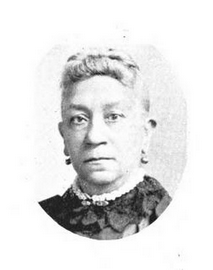
Sarah Jane Woodson Early, born Sarah Jane Woodson, was an American educator, black nationalist, temperance activist and author. A graduate of Oberlin College, where she majored in classics, she was hired at Wilberforce University in 1858 as the first black woman college instructor, and also the first black American to teach at a historically black college or university (HBCU).

Eben Alexander was an American scholar, educator, dean, and diplomat.
James Henry Harris (1832–1891) was an American civil rights advocate, upholsterer, and politician. Born into slavery, he was freed as a young adult and worked as a carpenter's apprentice and worker before he went to Oberlin College in Ohio. For a time, he lived in Chatham, Ontario, where he was a member of the Chatham Vigilance Committee that aimed to prevent blacks being transported out of Canada and sold as slaves in the United States.

Bess Bolden Walcott (1886-1988) was an American educator, librarian, museum curator and activist who helped establish the historical significance of the Tuskegee University. Recruited by Booker T. Washington to help him coordinate his library and teach science, she remained at the institute until 1962, but continued her service into the 1970s. Throughout her fifty-four year career at Tuskegee, she organized Washington's library, taught science and English at the institute, served as founder and editor of two of the major campus publications, directed public relations, established the Red Cross chapter, curated the George Washington Carver collection and museum and assisted in Tuskegee being placed on the National Register of Historic Places.
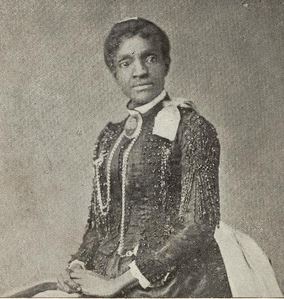
Nellie A. Ramsey Leslie was notable as a teacher, musician and composer, working in Louisiana and Mississippi, and then in Indian Territory and Corpus Christi, Texas, where she founded a musical conservatory for girls. Born into slavery in Virginia, after emancipation she gained schooling in Ohio and moved to Louisiana to teach for the Freedmen's Bureau. She attended the Normal School of Straight University and gained further training as a teacher. Teaching in Louisiana, Mississippi, Indian Territory, and Texas, Leslie educated freedmen and their children. She was widely known as a music educator and composer, as well as performer, although none of her works is known to be extant.

Zelia Ball Page (1850–1937) was a freeborn African-American teacher who spent her career teaching black youths in Missouri, Oklahoma and Tennessee. Her husband was the first head of Langston University and she was the first matron.

Haydee Campbell was an American educator, an advocate for kindergarten for African-American children.
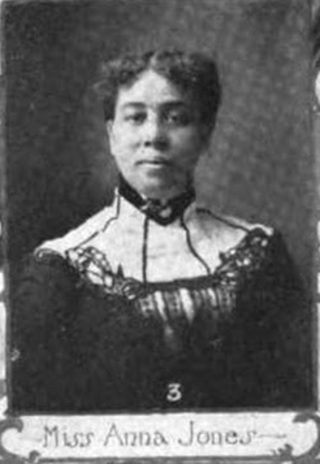
Anna H. Jones was a Canadian-born American clubwoman, suffragist, and educator based in later life in Kansas City, Missouri.

Sophia Bethena Jones was a Canadian-born American medical doctor, the first black woman to graduate from the University of Michigan Medical School. She founded the Nursing Program at Spelman College and was the first black faculty member at Spelman College.
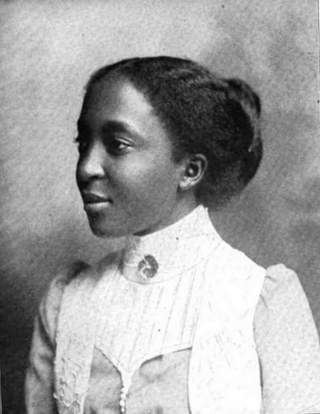
Lena Terrell Jackson was an American educator. She taught Latin to African-American students in Nashville, Tennessee for over fifty years.
Sara Iredell Fleetwood (1849–1908) was an American clubwoman and teacher. She was involved in the movement of black women into professional nursing, graduating as one of the first nurses from Howard University's Freedman's Hospital School of Nursing. She became the nursing superintendent at Freedman's, organized the Freedmen's Nursing Association and served as the first African-American woman on the nurse's examining board of the District of Columbia.
Sara Griffith Stanley Woodward was an African-American abolitionist, missionary teacher, and published author. Sara, sometimes listed as "Sarah", came from a biracial family, of which both black and white sides owned slaves. Despite this fact, she spent most of her working life to further the cause of freedom and civil rights for African Americans. Her family's wealth and affluence enabled her to obtain a diploma in "Ladies Courses" from Oberlin College, the first college in the United States to admit African Americans beginning in 1835. She wrote and published several abolitionist works in journal magazines, but her most famous writing was an address on behalf of the Delaware Ladies' Antislavery Society given at the State Convention of Colored Men during the 1856 election year. After the Civil War, she spent several years working as a teacher for the American Missionary Association, working in the North and in the South educating African-American children.
Lucinda Bragg Adams was an American composer, writer, editor, and physician.
Minnie Lou Crosthwaite was an American teacher who became the first Black woman to pass the teacher exam in Nashville's segregated school system. She later became an instructor and then registrar at Fisk University, and was influential in the social life and the education of the city's African-American community.

Charles Norfleet Hunter, more commonly known as Charles N. Hunter, was an American educator, journalist, and historian. Hunter actively engaged in several late nineteenth-century reform movements. In the 1870s, he participated in the Temperance movement. Beginning in his twenties, Hunter played a significant role as a teacher or principal at the "Colored Graded Schools" in Durham, Goldsboro, and Raleigh as well as at rural schools in Robeson, Chatham, Cumberland, and Johnston Counties. Hunter also helped lead an initiative to build the Berry O'Kelly Training School in Method, North Carolina.
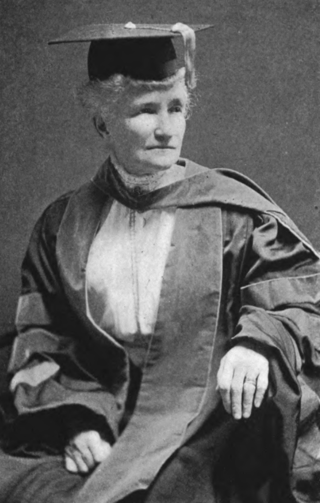
Adelia Antoinette Field Johnston was an American educator and college administrator. She was the first female faculty member at Oberlin College, where she taught history, and the school's Dean of Women from 1870 to 1900.
The North Carolina State Colored Industrial Fair also referred to as the North Carolina Colored Fair, was first held in Raleigh, North Carolina in 1879 and continued to be held for about 50 years until 1930. A historical marker commemorated the fairs was erected in 2018.